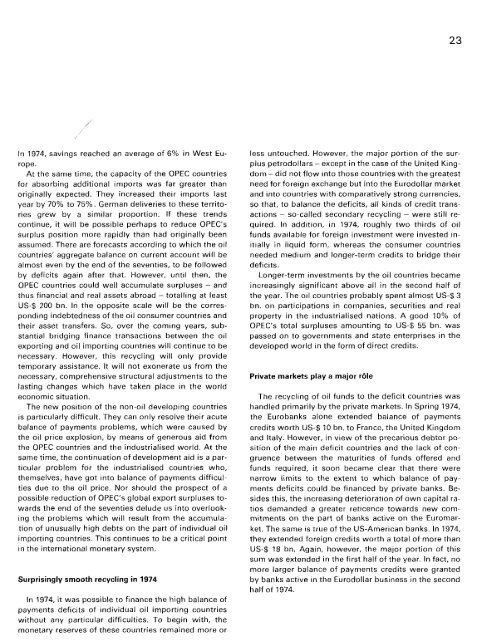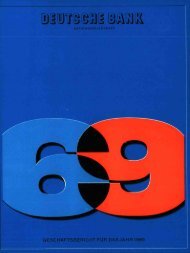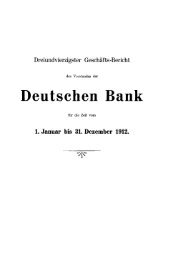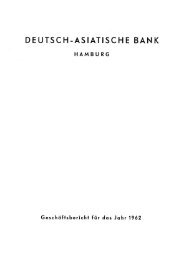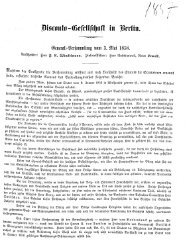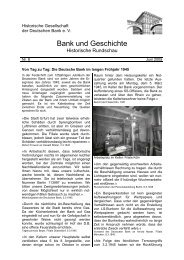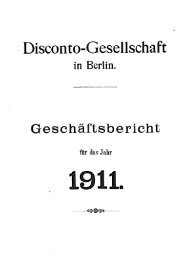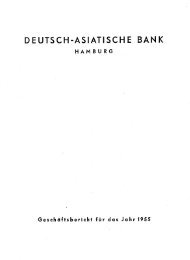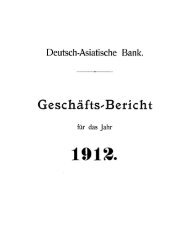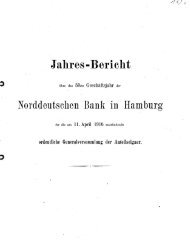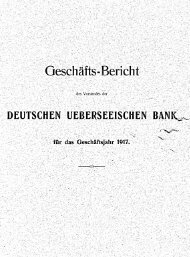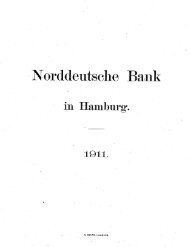Deutsche Bank 1 - Historische Gesellschaft der Deutschen Bank e.V.
Deutsche Bank 1 - Historische Gesellschaft der Deutschen Bank e.V.
Deutsche Bank 1 - Historische Gesellschaft der Deutschen Bank e.V.
You also want an ePaper? Increase the reach of your titles
YUMPU automatically turns print PDFs into web optimized ePapers that Google loves.
In 1974, savings reached an average of 6% in West Eu-<br />
rope.<br />
At the Same time, the capacity of the OPEC countries<br />
for absorbing additional imports was far greater than<br />
originally expected. They increased their irnports last<br />
year by 70% to 75%. German deliveries to these territo-<br />
ries grew by a similar proportion. If these trends<br />
continue, it will be possible perhaps to reduce OPEC's<br />
surplus position more rapidly than had originally been<br />
assumed. There are forecasts according to which the oil<br />
countries' aggregate balance on current account will be<br />
alrnost even by the end of the sevcnties, to be followed<br />
by deficits again after that. However, until then, the<br />
OPEC countries could well accumulate surpluses - and<br />
thus financial and real assets abroad - totalling at least<br />
US-$ 200 bn. In the opposite scale will be the corres-<br />
ponding indebtedness of the oil consumer countries and<br />
their asset transfers. So, over the coming years, sub-<br />
stantial bridging finance transactions between the oil<br />
exporting and oil irnporting countries will continue to be<br />
necessary. However, this recycling will only provide<br />
ternporary assistance. It will not exonerate us from the<br />
necessary, corriprehensive structural adjustments to the<br />
lasting changes which have taken place in the world<br />
economic situation.<br />
The new position of the non-oil developing countries<br />
is particularly difficult. They can only resolve their acute<br />
balance of payments problerns, which were caused by<br />
the oil price explosiori, by means of generous aid frorn<br />
the OPEC countries and the industrialised world. At the<br />
same time, the continuation of development aid is a par-<br />
ticular problem for the industrialised countries who,<br />
themselves, have got into balance of payrnents difficul-<br />
ties due to the oil price. Nor should the prospect of a<br />
possible reduction of OPEC's global export surpluses to-<br />
wards the end of the seventies delude us into overlook-<br />
ing the problems which will result from the accumula-<br />
tion of unusually high debts on the part of individual oil<br />
importing countries. This continues to be a critical point<br />
in the international monetary System.<br />
Surprisingly smooth recycling in 1974<br />
In 1974, it was possible to finance the high balance of<br />
payments deficits of individual oil importing countries<br />
without any particular difficulties. To begin with, the<br />
rnonetary reserves of these countries remained rnore or<br />
less untouched. However, the major portion of the sur-<br />
plus petrodollars - except in the case of the United King-<br />
dom - did not flow into those countries with the greatest<br />
need for foreign exchange but into the Eurodollar market<br />
and into countries with comparatively strong currencies,<br />
so that, to balance the deficits, all kinds of credit trans-<br />
actions - so-called secondary recycling - were still re-<br />
quired. In addition, in 1974, roughly two thirds of oil<br />
funds available for foreign investrnent were invested in-<br />
itially in liquid form, whereas the consumer countries<br />
needed medium and longer-term credits to bridge their<br />
deficits.<br />
Longer-term investrnents by the oil countries became<br />
increasingly significant above all in the second half of<br />
the year. The oil countries probably spent almost US-$ 3<br />
bn. on participations in cornpanies, securities and real<br />
property in the industrialised nations. A good 10% of<br />
OPEC's total surpluses amounting to US-$ 55 bn. was<br />
passed on to yovernrnents and state enterprises in the<br />
developed world in the form of direct credits.<br />
Private markets play a major r6le<br />
The recycling of oil funds to the deficit countries was<br />
handled primarily by the private markets. In Spring 1974,<br />
the Eurobanks alone extended balance of payrnents<br />
credits worth US-$ 10 bn. to Francc, the United Kirlgdorn<br />
and Italy. However, in view of the precarious debtor po-<br />
sition of the main deficit couiitries and the lack of con-<br />
gruence between the maturities of funds offered and<br />
funds required, it soon became clear that there were<br />
narrow limits to the exteiit to which balance of pay-<br />
rnents deficits could be financed by private banks. Be-<br />
sides this, the increasing deterioration of own capital ra-<br />
tios demanded a greater reticence towards new corn-<br />
mitments on the Part of banks active on the Eilromar-<br />
ket. The sarne is true of the US-American banks. In 1974,<br />
they extended foreign credits worth a total of more than<br />
US-$ 18 bn. Again, however, the major portion of this<br />
sum was extended in the first half of the year. In fact, no<br />
more larger balance of paynients credits were granted<br />
by banks active in the Eurodollar business in the second<br />
half of 1974.


